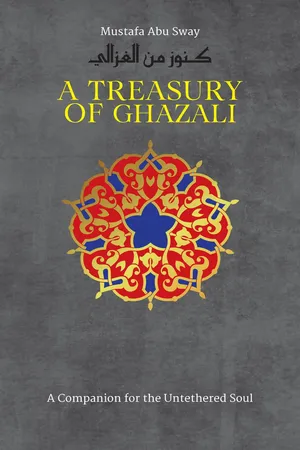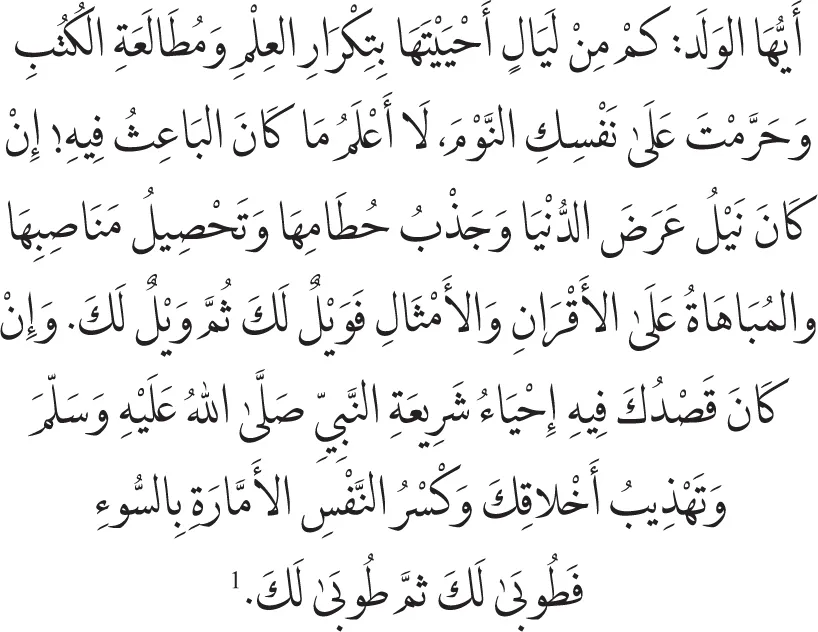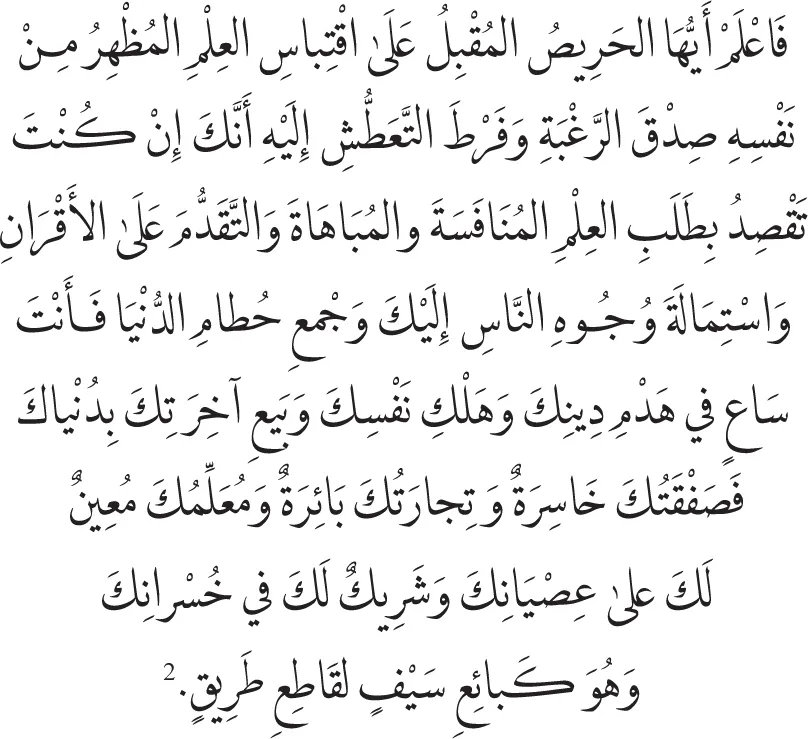![]()
Education with the Right Intention
O Son! How many nights have you stayed awake revising and memorising knowledge and poring over books, denying yourself sleep? I do not know what was the purpose of all this? If it was for the purpose of attaining worldly ends, securing its vanities and acquiring position and bragging before your peers, then woe to you! And again woe to you! But if your purpose for doing so was reviving the Sacred Law of the Prophet, may Allah bless him and grant him peace, refining your character and breaking the soul that commands to evil, then blessed are you! And again blessed are you!*
In Ayyuhā al-Walad (Dear Beloved Son!), Imām al-Ghazālī responded to the request of one of his students, who obviously spent years seeking knowledge, for further advice as to what knowledge is beneficial in the light of the Hereafter.
This request, while it was about seeking deeper insight into advantageous knowledge in the Hereafter, may be applied to all human activity. What is done for the sake of Allah earns one reward and what is done for worldly motives ends right here at best, but could land one in an unfavourable position in the Afterlife, and there is nothing worse!
Seeking fame, position and material wealth as ends in themselves is detrimental to the soul, but this is exactly what people have sought throughout history. Islam is not against material gain if it is lawful, and if one spends lawfully, without being stingy or a spendthrift, and pays the alms, which renders wealth pure. Indeed, Islam is not against obtaining lawful and lawfully-earned wealth. Wholesome income sought from lawful sources, for the right purpose, is good for the individual and the community for it allows one to carry out different social responsibilities. Suffice to know that there were wealthy Prophetic Companions, including ʿUthmān ibn ʿAffān, the third Rightly-guided Caliph, and ʿAbd al-Raḥmān ibn ʿAwf. Many Prophetic Companions donated substantial amounts of their money or property for the sake of public good.
As for fame, if it comes as a result of civic engagement, scientific achievement, championing humanitarian causes or any other good deed for the welfare of society or humanity at large, without translating this fame into pretentious behaviour, then it is a good thing because it can be utilised to further whatever project one has embarked upon. Service to all, Muslim and non-Muslim, is the key to success. Muslims are invited to contribute towards eliminating illiteracy, providing fresh water and sanitation, and fighting disease and poverty everywhere.
Yet, one should be wary of the potential negative impact of fame on the heart. Positions of responsibility, such as holding public office, should undoubtedly be filled. But in that case one has to remember that one is a public servant, and that the relationship with the public is horizontal, not vertical. One is on the same level as that of the people one serves, not higher than them. There is a problem if one is not the right person for the job, or does not have the necessary skills. There is a more serious problem if one is seeking a position of responsibility for egotistic reasons, a hunger for power, as a means to unlawful gains or to inflict harm on others!
![]()
Are You in the Wrong Business?
Therefore know, O you who is keen on knowledge and set out to acquire it and shows a genuine desire and real thirst to obtain it, that if your intention for seeking knowledge is rivalry, boasting, surpassing your peers, drawing people’s attention to you, and amassing the vanities of this world, then you are in reality in the process of ruining your religion, destroying yourself and selling your Hereafter in exchange for this worldly life—your transaction would therefore be an utter loss, and your trading profitless. [In such a case] your teacher would also be helping you in disobeying Allah and is your partner in loss, just like the person who sells a sword to a highway robber.*
This quotation is from Imām al-Ghazālī’s Bidāyat al-Hidāyah (The Beginning of Guidance), a small work which captures the essence of Iḥyā’ ʿUlūm al-Dīn (The Revival of the Religious Sciences), to which there are many cross-references.
Scholarship is laden with spiritual traps because it can nourish and sustain egotism. It can also lead to negative competition, showing off, and self-aggrandisement. Imām al-Ghazāli also warns against scholarship which is solely sought as a ticket to gain material wealth and accumulate what he described as the wreckage of this world. Every new thing that is desired in the world of commodities carries the mark of finitude. Every new thing, whether natural or artificial, has an expiry date and is destined to wither away. In the words of Rābiʿah al-ʿAdawiyyah, ‘All that which is on the surface of dust is dust itself!’
Elsewhere, Imām al-Ghazālī says that if you were to find yourself on a sinking ship, you would carry with you only that which will save you! Carrying your weighty belongings, even if they were of gold in such a situation is definitely not wise. Likewise, it is your good deeds (and bad ones too!) that continue with you after death. Your good deeds are your boat to safety!
Though Imām al-Ghazālī is here warning the students of knowledge who aim at occupying public offices, such as becoming a judge or an imam, everyone can benefit from checking their intentions, whether one studies the exact sciences, the humanities or art. There may still be room for egotism or ill intention in seeking any kind of knowledge or position, even when it apparently complies with Islamic law.
One should not be casual about what one is doing or why one is doing it. The challenge is to be God-conscious, watch one’s heart carefully to detect the residues of ‘I’ and cleanse one’s heart of such impurities. This is why one seeks refuge in Allah against associating anything or anyone with Him. Muslims are very careful about idol worshiping when the idol is physical, but the same should be applied to metaphorical idols such as fame and wealth. This is why the Sufis talk about the state of annihilation (fanā’) whereby the heart is only aware of the Divine presence and nothing else.










